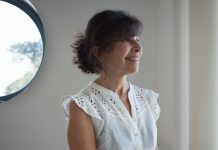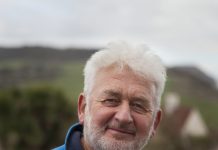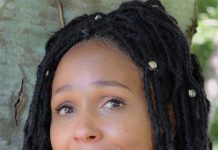Jenny Hopkin met Veronica Bickford at Seatown, Dorset. This is Veronica’s story:
‘It was in 1954, that I came from Malaysia to live in Chideock. I was 26 and a pregnant widow, my daughter, Georgiana was only thirteen months. My husband, Humphrey, an engineer, had tragically died of anterior poliomyelitis. We were on leave in one of the hill stations and I remember him saying ‘I think I’m getting flu’. I insisted on him resting in bed.
He gradually became weaker. A doctor friend, staying nearby, was puzzled. Polio is rather rare in a 38 year old, and so, ruled it out. With kind help from some army friends, Humphrey was brought down on a stretcher in a jeep to the hospital in Taiping where he was diagnosed as having polio. He only lived for three more days.
Humphrey had, in his twenties, served in the Royal Navy, as indeed had his father and grandfather, but he was invalided out following a car accident. During the war years he worked at the Admiralty developing a special compass for use on submarines. After the war he joined the Colonial Engineering Service in Malaya, where, I, a young Queen Alexander’s Royal Army Nursing Service Sister, first met him. I had been posted to Hong Kong.
My brother, Edward and I were born and bred in Liverpool. We lived most of the time with two maiden aunts and their brother, uncle Bertie. I can remember accompanying one of the aunts to an agency to hire a maid. I asked the aunt to choose a pretty one, but the reply was ‘No, because of uncle Bertie’, which I found puzzling at the time. Edward was seven years older than me and joined the Royal Air Force before the war. He gave me a love of flying and used to take me to Speke Airport where we had ten shilling flips in a Tiger Moth. During the war I went to school in Llandudno, North Wales. From there one could see the fires of Liverpool. My beloved brother, an RAF pilot, was killed in 1943. It affected us all very deeply. Because of him, when I came to Dorset I took a few lessons with an ex fighter pilot at Dunkeswell Flying Club, but chickened out when we got to the stalling stage, so I never went solo; by then I had two children to consider.
When I left school I trained as a nurse in Liverpool. I also did a Diploma in tropical medicine. I think I became fascinated with the tropics because, as a child, I used to visit the Palm House in Liverpool. I loved the smell of the plants.
Having completed my training I joined the Queen Alexandra nurses, and was posted out to Hong Kong in 1949. I travelled out by sea. It took six weeks. We were officers, and went to lots of swish cocktail parties, but sometimes, some of the other girls and I went down to the soldier’s quarters, below deck, awful really, and danced with them. While in Hong Kong, to eek out rather poor army pay, I worked, under an assumed name, as a DJ on Radio Hong Kong doing a Forces Hospital request programme. I used to sneak in one or two of my choices amongst the Vera Lynns, such as Jean Sablon or a bit of grand opera, hoping the soldiers would enjoy them too.
After Hong Kong I went to Singapore, and then Malaysia where I met my husband. My training in Liverpool had been excellent; the nurses were taught a lot of techniques; I often prepared and examined slides to test for leprosy.
After my husband died I wanted to live in Dorset, so, I put an advert in The Lady magazine for a cottage and had a reply from Chideock, where I lived for two years before I moved to Seatown. It was wonderful to be so near the sea. The children and I swam almost every day and I acquired the reputation of being the first woman to be seen on Seatown beach wearing a bikini – this was in the late 1950s.
When the children started school I returned to nursing at Bridport Hospital. I worked there for 26 years until I retired. My father and mother came to live with me in Seatown, and ended their days here. My aunt and uncle Bertie also lived with me in their later years.
I am interested in the stock market and dabble in pharmaceutical stocks and shares. A few of us meet in the George in Bridport to share information and tips. I once went to a meeting at Olympia run by the Investors Chronicle. I saw Adam Faith, a great favourite of mine, so I went across to ask him for his autograph. He signed my programme and underneath wrote the name of a company. I didn’t realise exactly what it was until a few days later. In the Sunday Observer the tip of the week was that these shares had gone from ten pence each to one pound. I quickly bought some and they went up to three pounds. Unfortunately, I didn’t sell then, and they dropped away to nothing. But at least I got his autograph.
I always wanted to go on the stage, but of course my parents wouldn’t hear of it when I was a girl. In Malaysia I once got a chance to play the lead in a production of The Importance of being Ernest, but sadly I was in a car accident just before rehearsals started, and, as I had cuts and bruises to my face, I had to withdraw. Later I joined, and performed with, the Chideock players. Quite recently I was filmed by Countrywide Films for the DVD Coastal Ways. I’m still a busy person and read twice a week to a lady of ninety-eight in Bridport, and I swim in the sea whenever the tide and weather are right.
I’ve always tried to live a healthy life, so I eat lots of honey; I use it to sweeten my tea. Some years ago my son, Humphrey, bought me two beehives, complete with bees. He arrived with them in his van. It was dark, but the bees were very angry. I was frightened they would see the light in my studio and come in. I was sleeping there as I had rented the cottage out to holiday makers. I was so concerned, that I slept in my bee keeper’s suit. The next morning I checked the bees through binoculars to see if they were peaceful before I took off my outfit. Now I’m eighty I have some sheep’s milk yogurt every day – apparently there is an enzyme in it that stops you getting Alzheimer’s.
I still find Seatown magical and on a clear night I drink my cocoa sitting on the veranda listening to the sea and looking at the stars, which my father had taught me to identify. My son, Humphrey, recently featured in Dorset Men, lives in Bridport, but keeps his lobster pots here. My daughter, Georgiana, who was also widowed young, lives in Crewkerne. Her son, Hugh is on a yacht skipper’s course in Australia. The sea is in our blood.’









